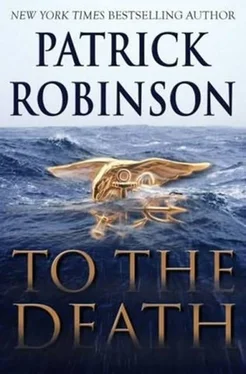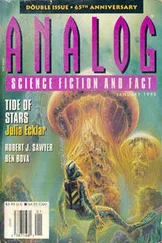The bells of the watch came and went. The day finally gave way to night, and by now the Kilo was sixty-five miles closer. In waters this deep, there is no appreciable advantage to any ship, because it is not possible to “back up” against a “noisy” landmass and force your quarry to aim its sonars into the most confusing area. Out here, where the ocean is vast and empty, bereft of any land, all’s fair. The hunter must stay quiet, and the hunted is supposed to stay even quieter, though in the case of Captain Abad this was impossible.
Generally speaking, a U.S. Navy underwater boat has it all over any perceived opponent, but the Kilo was only weeks out of refit, and in recent years the Russians had done a great deal of catching up.
Cheyenne, with that towed array, would certainly locate the Kilo first, but there was an excellent chance the Kilo would pick up the Americans in the end. Thereafter, it was a matter of Captain Abad holding his nerve and hoping to hell the U.S. commanding officer did not feel especially trigger-happy.
A bookmaker would almost certainly have made the Americans favorite to do anything they liked. And that would be logical, if it was just any old Kilo sliding through the water. But this particular Kilo was state-of-the-art, and there was a chance that some U.S. advantage might have been eliminated in the secretive laboratories of St. Petersburg ’s Admiralty Yards.
The watch changed at midnight. But no one left the sonar room. Everyone knew the Kilo must be approaching. Her course was plainly direct to the Gibraltar Strait, and, so far as the American navigators were concerned, she was already late.
The satellite pictures had recorded her leaving the coast of Lebanon, and she’d been snorkeling all the way at a steady twelve knots. In the hot still of this Mediterranean night, the Kilo kept going, oblivious of the presence of USS Cheyenne. Captain Abad was confident out here in the dark, in deep lonely waters, but he was instinctively concerned about the sea-scape further west in the busy shipping lanes which lead into, and out of, the Atlantic Ocean.
At 0034, still at periscope depth, with the air-intake mast up and the big diesel generators, deep within the submarine, running smoothly, the Kilo was picked up by the Cheyenne twenty miles away.
Chief Petty Officer Skip Gowans said quietly, “I might have something right here, just a faint rise in the level. It could be a rain shower, swishing on the surface-but I thought it was something… arrived kinda sudden… give me a few minutes.”
Commander Redford was standing right at his shoulder. No one spoke, and the chief did not say anything more for at least four minutes. Then he said, “I have a definite rise in the level. I don’t think it’s weather-I’m getting something.”
Again there was silence. Chief Gowans was a study in concentration. The entire operations center was hanging on his decision, and at 0044 he gave it: “Captain-sonar… I have faint engine lines coming up on the array. Relative eight-nine. Lines fit the sample, sir.”
Commander Redford moved nearer to the “waterfall” screen, which now showed definite engine lines. The computer had already compared them with the Kilo engine sample built into the system.
Chief Gowans muttered, “They fit, sir. No doubt.”
Hank Redford snapped, “Gimme the range.”
“Not close, sir. I’m thinking first convergence. And the bearing hasn’t moved. I’d say she’s coming dead toward us. In my opinion, she’s snorkeling right now. Those Russian Kilos are usually very quiet, but this guy’s making one hell of a racket.”
“We don’t have orders to sink her,” said the CO. “So long as she’s coming straight at us, we’ll hold this course and remain below ten knots.”
“Sir,” said Chief Gowans, “the solution looks good, she’s still out to the east, maybe twenty miles, and still coming our way. She’s not cavitating, which means she’s making under nine knots.”
Back in the Kilo, Captain Abad’s team did not pick up the Cheyenne. He was now running close to the coast of Algiers, and he told himself for the umpteenth time on this journey that the stealth of the Kilo was always his ally. And he could, if necessary, vanish long before he was cornered. They kept running west-sou’west until dawn, making fifteen knots at periscope depth.
In Cheyenne ’s ops room, the engine lines of the Kilo never vanished from the screens. But as her speed increased and the two boats closed to within ten miles of each other, the Americans altered course to one-nine-zero, steering almost due south to gain close contact. This was the most one-sided game of cat-and-mouse. Neither CO had orders to shoot, but the Americans essentially had the Kilo on toast.
1500 Saturday 7 July County Tipperary, Ireland
Shakira Rashood made a leisurely journey across Ireland, driving out of Dublin and heading south across County Kildare and then on down through County Loais. She brought with her an ordnance map that marked the Coolmore Stud close to the little village of Fethard. So far as she could see, the nearest sizable town was Cashel.
She was not planning to buy a racehorse, but like many Arabs she had an inbuilt affinity with the thoroughbred, and she knew that most of the world’s high-mettled racers traced their ancestry back to the desert sands of her forefathers. There was only one famous Arab horse of whom she had heard, and that was the Darley Arabian. And she wondered whether any of his descendants had ended up at Coolmore, which Michael O’Donnell had pronounced the greatest stud farm on earth.
She was not of course to know that every single flat-racing stallion on the Coolmore roster traced back to the Darley Arabian, through his direct descendant Eclipse. And she wished her husband had been with her, because he, somewhat surprisingly for a wanted terrorist hitman, was quite knowledgeable on the subject. General Rashood’s own father, Iranian-born but London-domiciled, was a horse breeder of some note, having very nearly won the Ascot Gold Cup a few years back.
Shakira and Ravi often walked through Damascus to pick up the English newspapers, and she was accustomed to seeing him turn to the racing pages for the results, cards, and reports. He frequently said he missed going racing in England with his father, and that one day, if he could ever return, he would like to own a couple of decent runners. They both knew this was a distinctly unlikely possibility, mass murderers being generally discouraged from attending British and Irish racecourses.
Shakira had, of course, never even seen a thoroughbred in action, but it was a curious piece of unfulfilled ambition. She liked racehorses, liked being told about them, although it had been impossible for her to display anything but the most profound ignorance in the presence of Michael O’Donnell.
And now she was in the heartland of the thoroughbred, County Tipperary, where the great ones had either been born, been trained, or ended their days as stallions and broodmares. She stopped at the newspaper shop in Cashel and bought a small local history of the thoroughbred industry in and around the town.
The names were strange to her, the Derby winners, Nijinsky, Sir Ivor, Roberto, The Minstrel, Galileo, the world-famous sires, Sadlers Wells, Caerleon, Be My Guest, Danehill, Giant’s Causeway. But the names rang with poetry, seeming to echo through the Golden Vale of Tipperary where she now stood.
Shakira signaled for her driver to park the car in a long drive in front of the hotel where her guidebook had suggested she stay. It was a grand pink-bricked eighteenth-century building, now converted into the Cashel Palace Hotel, a mecca for visiting horsemen from all over the world. There had been a mass exodus north from the town for Irish Derby weekend, and it was no trouble booking a single room for a few days. She just checked in, using a hitherto unused American Express card, issued to a British citizen, Margaret Adams. No one even asked to see her passport.
Читать дальше












